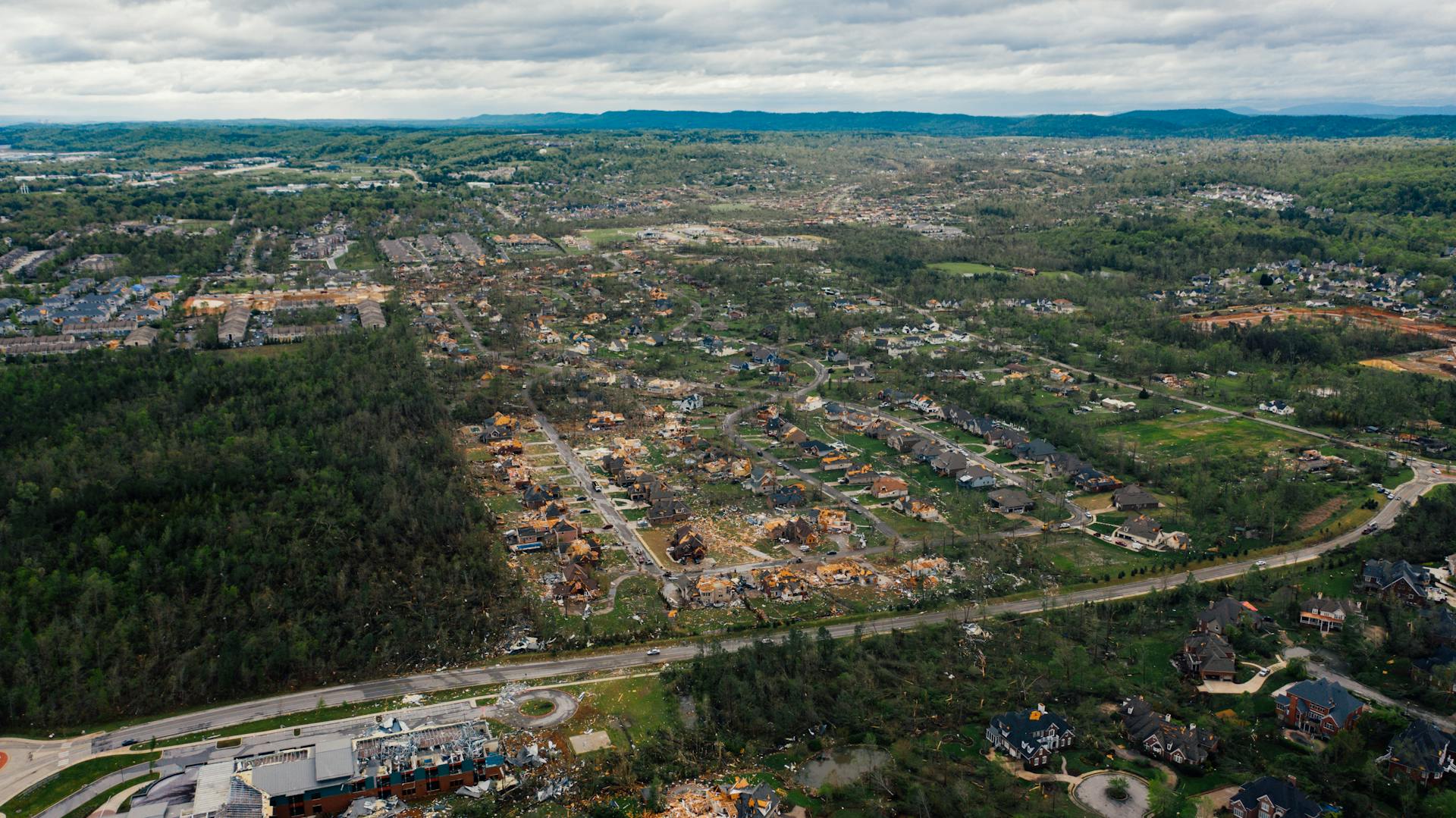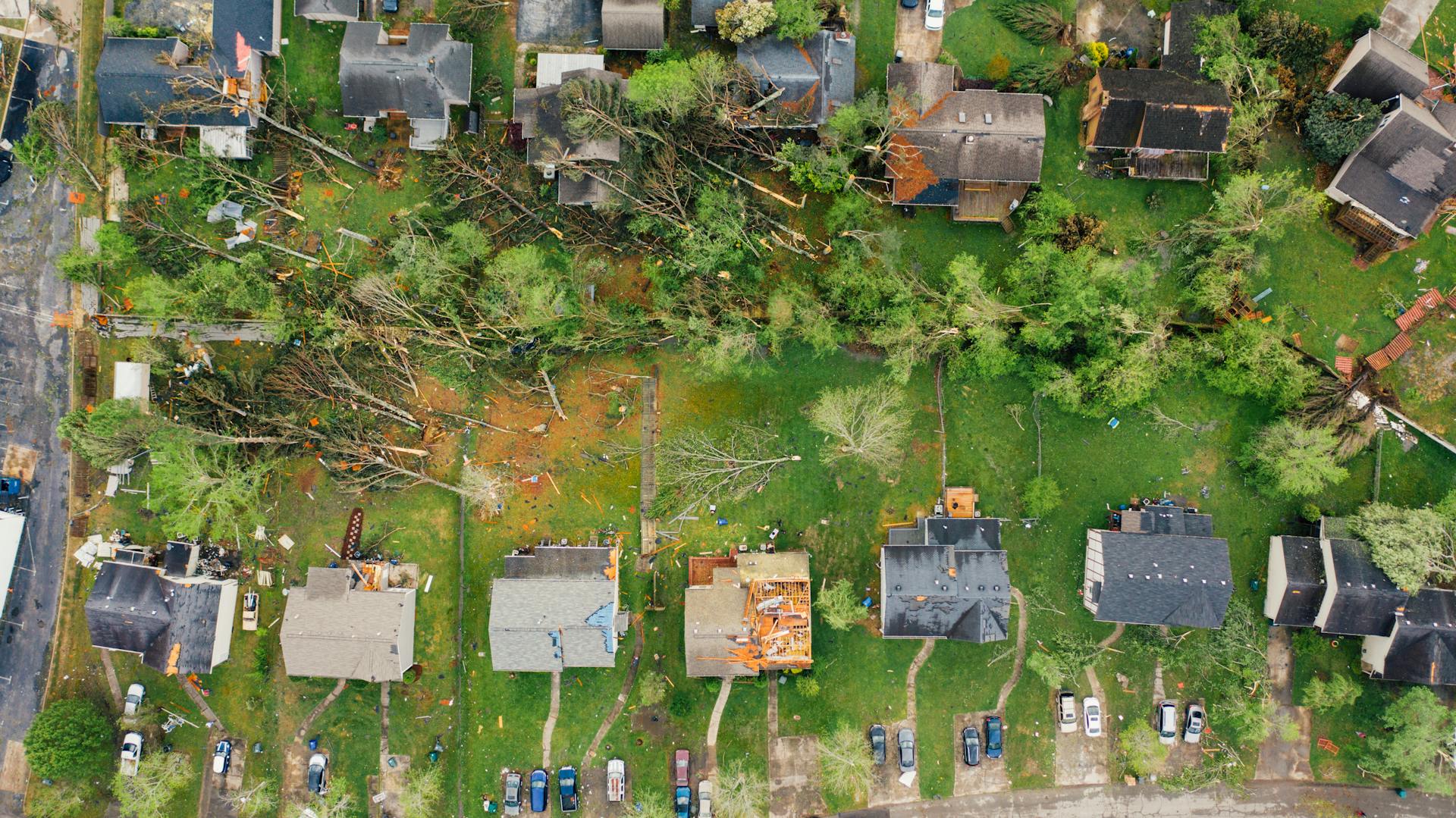
Tornado damage can be devastating, and it's natural to wonder if your car insurance will cover the costs of repairing or replacing your vehicle and property.
Most standard car insurance policies do cover damage caused by tornadoes, but the extent of coverage varies depending on the policy and the circumstances.
If you have comprehensive coverage, which is usually optional, you're likely covered for tornado damage. Comprehensive coverage pays for damage to your vehicle that's not caused by a collision.
Typically, comprehensive coverage includes damage from natural disasters like tornadoes, hail, and floods.
Additional reading: Does Homeowners Insurance Cover Natural Disasters
Filing a Claim
Filing a claim after a tornado can be a daunting task, but it's essential to act quickly to get the compensation you deserve.
You should file a claim as soon as possible because insurance companies get bombarded with phone calls and claims after a natural disaster. The sooner you get yours in, the sooner you can get compensated for the damage.
You might enjoy: How to Claim Car Insurance for Own Damage
To file a claim, you'll need to provide your insurance company with details about the damage, including photos and any relevant documentation such as police reports.
Here are the steps to follow:
- Call your insurance company to report the damage.
- Take pictures of the damage and provide before pictures if you have them.
- Cooperate with the claims adjuster to get estimates from repair shops.
- Pay your deductible to complete the repairs.
If your claim is denied or the insurance settlement doesn’t fully cover the cost of repairs or replacements, you may be able to turn to the Federal Emergency Management Agency (FEMA) for help.
It's also essential to remember that filing a claim can raise your rates, so it's crucial to assess the damage carefully and only file a claim if the cost of repairs exceeds your deductible.
By following these steps and understanding the process, you can navigate the claims process with ease and get the compensation you deserve.
You might enjoy: Vehicle Insurance Claim
Vehicle Storm Damage
If your car is damaged by a storm, you should first assess the damage and determine if it's severe enough to warrant contacting your insurance company. Filing a claim can raise your rates, so make sure the cost of repairs exceeds your deductible, which is the minimum amount you have to contribute out of pocket.
If you decide to file a claim, prevent additional damage by sealing or covering cracked windows or windshields and making other minor repairs as necessary. You should also dry your car out as thoroughly as possible once the storm ends to avoid a long-lasting odor and rusting or other kinds of internal water damage.
Comprehensive coverage is key to protecting your vehicle from storm damage, including tornadoes. If you have comprehensive coverage in place, it's likely covered if your car needs repair due to wind damage or other storm-related issues.
A basic car insurance policy that only includes state-mandated liability insurance won't cover any damage your vehicle incurs during a storm. Liability insurance will only take care of another person's medical bills and property repairs if you injure them or damage their property while driving during a storm.
If you get into a car accident while driving in bad weather and the other driver is found to be at fault, their bodily injury liability insurance or property damage liability insurance would likely take care of your medical expenses or repair costs, respectively. However, no type of liability auto insurance will cover damage to your car that is caused by the storm itself.
To make sure you're protected, check your specific auto insurance policy to determine what exclusions and limitations your policy holds. About 80% of U.S. drivers carry comprehensive coverage, which is typically required if you have an auto loan or lease.
For another approach, see: Does Homeowners Insurance Cover Storm Damage
Aftermath and Next Steps
After a tornado strikes and causes damage to your vehicle, it's essential to take immediate action to ensure you're covered by your car insurance policy.
If your policy includes comprehensive coverage, you can file a claim to repair or replace your vehicle. This type of coverage typically pays for damages caused by events like tornadoes, hail, and flood.
To initiate the claims process, gather all relevant documents, including your policy details, vehicle registration, and any photos of the damage. You can then contact your insurance provider to report the incident and schedule an inspection.
The insurance company will assess the damage and provide a quote for repairs or a replacement vehicle. In some cases, they may also offer a rental car to keep you mobile while your vehicle is being repaired.
Water Disruption Due to Flooding
Water Disruption Due to Flooding can be a nightmare for car owners. Flooding is a specific type of water damage that's usually excluded from comprehensive coverage.
On a similar theme: Does Renters Insurance Cover Basement Flooding

Comprehensive coverage specifically excludes water damage caused by flooding. This means if your car is submerged in water during a flood, you might not be covered under your policy.
However, if severe weather like a hurricane causes flooding, and your car is damaged as a result, your comprehensive coverage might still apply. This can be a gray area, and it's essential to review your policy specifics.
Flooding can cause extensive damage to your car's electrical system, engine, and other components. If you're unsure about what's covered, it's best to consult with your insurance provider.
A unique perspective: Why Is Anucort-hc Not Covered by Insurance?
Return to Normal
As you're navigating the aftermath of a tornado, it's essential to focus on getting back to normal as quickly as possible.
Your car insurance policy can help cover damage from severe storms like tornadoes, but it depends on the type of coverage you have and any exclusions or limitations.
It's a good idea to review your policy carefully and contact your insurance provider to understand what's covered and what's not.
To get back on the road, you'll need to assess the damage to your vehicle and determine what repairs are needed.
Keep in mind that the type of coverage that applies for tornadoes will depend on what caused the damages, where and when the damages happened, and more.
Recommended read: Does Renters Insurance Cover Damages When Moving Out
General Information
Comprehensive auto insurance covers damage from weather to your car. This type of insurance is usually required if you're paying a car loan or lease.
If you're involved in a weather-related incident, don't drive your car until an adjuster has assessed the damage. This is an important step to ensure your safety and the accuracy of your claim.
Comprehensive insurance typically has a deductible, which is the amount you'll need to pay out of pocket before your insurance kicks in.
What Is Comprehensive?
Comprehensive coverage is a type of auto insurance that protects your vehicle from damage caused by external sources or events that don't involve another vehicle.
This coverage includes damage from tornadoes, hurricanes, theft, vandalism, falling objects, and flooding. If a tornado rolls through your neighborhood and damages your car, comprehensive coverage should cover the damage.
Comprehensive coverage is often required if you pay a car loan or lease. If you're unsure whether you have comprehensive coverage, check your policy documents.
Comprehensive insurance can make a big difference in the event of weather-related damage. Without it, you could be responsible for the costs of repairs.
Here are some key points to keep in mind:
- Comprehensive auto insurance covers damage from weather to your car.
- Comprehensive insurance is often required if you pay a car loan or lease.
Wildfires?
Wildfires can be a devastating and unpredictable force of nature. Comprehensive coverage can help pay for repair or replacement if your car is damaged or a total loss due to a wildfire.
A wildfire is considered a natural disaster or weather-related event in most cases. This means that your car insurance may cover damages caused by a wildfire, depending on your coverage.
Comprehensive coverage is a type of car insurance that covers damages to your vehicle that are not related to a collision, such as damage from a wildfire. It's a good idea to review your policy to see if you have comprehensive coverage.
Sources
- https://www.insurance.com/natural-disasters/tornado-insurance/does-car-insurance-cover-tornado-damage
- https://clovered.com/does-car-insurance-cover-tornado-damage/
- https://smartfinancial.com/does-car-insurance-cover-storm-damage
- https://blog.clearcover.com/posts/does-car-insurance-cover-storm-damage
- https://www.kbb.com/car-advice/insurance/weather-related-damage/
Featured Images: pexels.com


